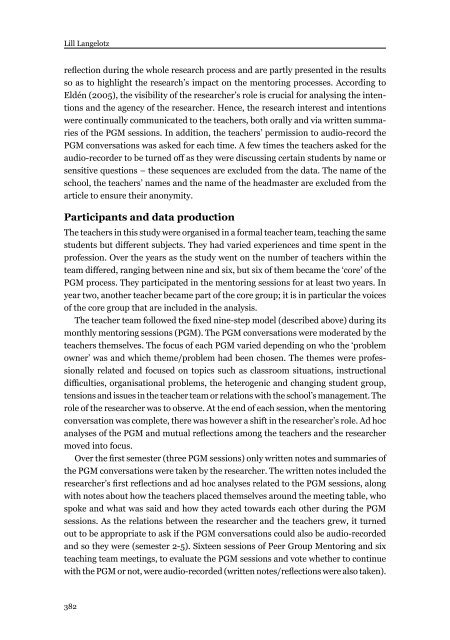Download issue - Umeå universitet
Download issue - Umeå universitet
Download issue - Umeå universitet
You also want an ePaper? Increase the reach of your titles
YUMPU automatically turns print PDFs into web optimized ePapers that Google loves.
Lill Langelotz<br />
reflection during the whole research process and are partly presented in the results<br />
so as to highlight the research’s impact on the mentoring processes. According to<br />
Eldén (2005), the visibility of the researcher’s role is crucial for analysing the intentions<br />
and the agency of the researcher. Hence, the research interest and intentions<br />
were continually communicated to the teachers, both orally and via written summaries<br />
of the PGM sessions. In addition, the teachers’ permission to audio-record the<br />
PGM conversations was asked for each time. A few times the teachers asked for the<br />
audio-recorder to be turned off as they were discussing certain students by name or<br />
sensitive questions – these sequences are excluded from the data. The name of the<br />
school, the teachers’ names and the name of the headmaster are excluded from the<br />
article to ensure their anonymity.<br />
Participants and data production<br />
The teachers in this study were organised in a formal teacher team, teaching the same<br />
students but different subjects. They had varied experiences and time spent in the<br />
profession. Over the years as the study went on the number of teachers within the<br />
team differed, ranging between nine and six, but six of them became the ‘core’ of the<br />
PGM process. They participated in the mentoring sessions for at least two years. In<br />
year two, another teacher became part of the core group; it is in particular the voices<br />
of the core group that are included in the analysis.<br />
The teacher team followed the fixed nine-step model (described above) during its<br />
monthly mentoring sessions (PGM). The PGM conversations were moderated by the<br />
teachers themselves. The focus of each PGM varied depending on who the ‘problem<br />
owner’ was and which theme/problem had been chosen. The themes were professionally<br />
related and focused on topics such as classroom situations, instructional<br />
difficulties, organisational problems, the heterogenic and changing student group,<br />
tensions and <strong>issue</strong>s in the teacher team or relations with the school’s management. The<br />
role of the researcher was to observe. At the end of each session, when the mentoring<br />
conversation was complete, there was however a shift in the researcher’s role. Ad hoc<br />
analyses of the PGM and mutual reflections among the teachers and the researcher<br />
moved into focus.<br />
Over the first semester (three PGM sessions) only written notes and summaries of<br />
the PGM conversations were taken by the researcher. The written notes included the<br />
researcher’s first reflections and ad hoc analyses related to the PGM sessions, along<br />
with notes about how the teachers placed themselves around the meeting table, who<br />
spoke and what was said and how they acted towards each other during the PGM<br />
sessions. As the relations between the researcher and the teachers grew, it turned<br />
out to be appropriate to ask if the PGM conversations could also be audio-recorded<br />
and so they were (semester 2-5). Sixteen sessions of Peer Group Mentoring and six<br />
teaching team meetings, to evaluate the PGM sessions and vote whether to continue<br />
with the PGM or not, were audio-recorded (written notes/reflections were also taken).<br />
382

















